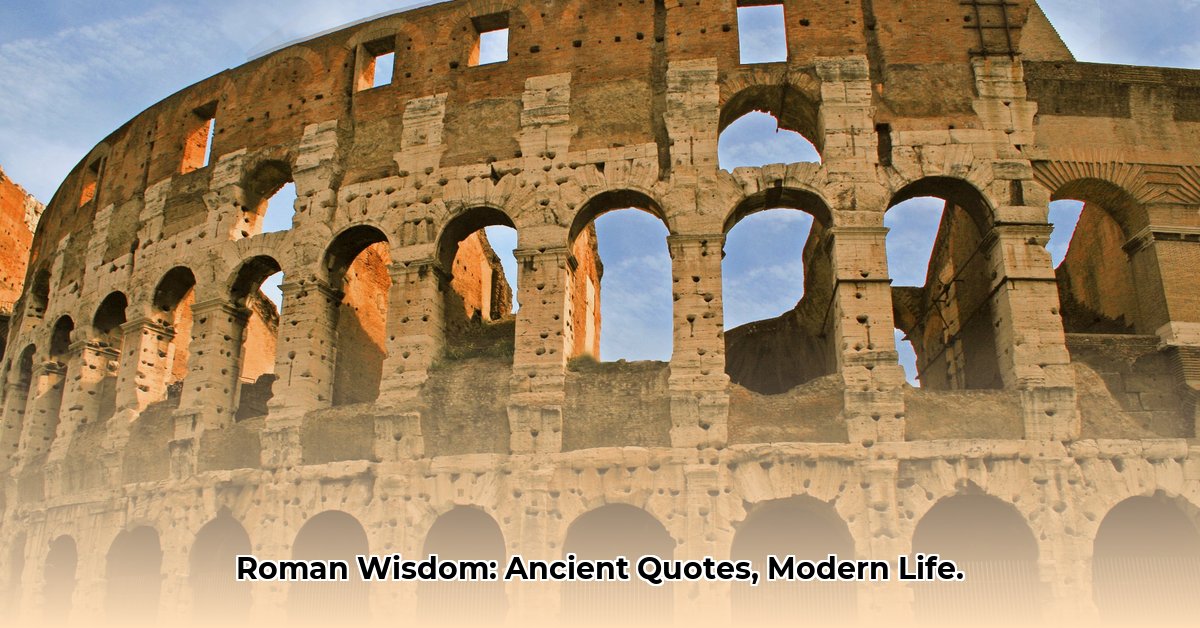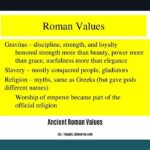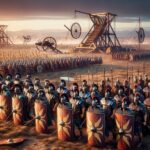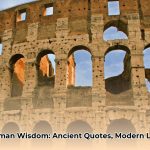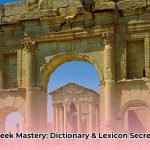Have you ever paused to consider what profound insights the people of ancient Rome, with their vast empire and complex society, might offer us today? Their words, etched in history, transcend millennia, providing a rich tapestry of ancient Roman quotes that illuminate paths to effective leadership, robust personal development, and a deeply fulfilling life. This comprehensive guide meticulously explores the original context and enduring significance of these timeless sayings, then demonstrates their direct and powerful applicability for making wiser decisions and fostering sustained personal growth in our intricate modern world. Prepare to journey through a legacy of wisdom that remains remarkably potent and pertinent in every facet of contemporary existence.
Check out these other ancient history quotes for more insights.
Echoes of Leadership from a Legendary Empire
What truly distinguishes a great leader? The Romans, architects of an immense empire and masters of an intricate political landscape, grappled deeply with this question, bequeathing a rich legacy of leadership lessons that resonate with unwavering clarity through the ages. Consider the strategic maxim, “Divide et impera”—”Divide and conquer,” a tactical principle often attributed to Roman military and political strategists. While its practicality is evident in modern business and even geopolitical maneuvers, is it consistently the most ethical or sustainable approach in today’s increasingly collaborative and interconnected global environment?
For today’s leaders, this ancient concept can be strategically adapted for project management. Breaking down expansive, intricate projects into smaller, more manageable components can significantly enhance efficiency, potentially boosting team-based productivity. However, astute leaders must also acutely recognize the inherent systemic risk of division leading to internal conflict and instability within an organization. A steadfast, long-term commitment to fostering unity, psychological safety, and profound collaboration should always remain a paramount priority, ensuring team cohesion and sustained organizational success.
Roman leadership principles extended far beyond mere strategic acumen. They fundamentally emphasized unwavering adherence to core values and leading by unequivocal, demonstrable example. In the contemporary corporate arena, where accountability, transparency, and integrity are highly prized by employees, investors, and stakeholders alike, a leader’s actions speak volumes, often more powerfully than any articulated vision. How can these ancient ideals, born from a different societal context, be thoughtfully adapted to harmoniously meet contemporary ethical standards while effectively integrating into a world characterized by diverse, globalized teams and operations? It underscores a critical necessity for leaders to cultivate profound flexibility, astute adaptability, and an unshakeable moral compass if they aspire to achieve not only immediate success but also enduring, impactful legacy.
The Enduring Significance of Roman Virtues: Virtus as a Guiding Star
For the Romans, the concept of virtus (virtue) was not merely an abstract philosophical ideal but an indispensable cornerstone of their society and individual conduct. Fundamental qualities such as fortitudo (courage), iustitia (justice), temperantia (temperance), and prudentia (wisdom) formed the inviolable bedrock of their ethical framework. But how do these profound Roman virtues, deeply rooted in antiquity, translate into our complex contemporary existence? Do we, as a global society, still ascribe the same profound, foundational value to these timeless qualities as the Romans once did?
The Roman understanding of virtue transcended simple good behavior; it embodied an unwavering, lifelong pursuit of excellence across all facets of human endeavor—from personal integrity and civic responsibility to military prowess and public service. This profound pursuit necessitates deep self-reflection on one’s core values, a clear articulation of long-term objectives, and demands exceptional resilience in the face of inevitable adversity. Furthermore, engaging thoughtfully with Stoic ideas can provide a robust, actionable philosophical framework for individuals and leaders seeking to manage stress more effectively, cultivate emotional intelligence, and build an unshakeable inner calm amidst external turbulence. It is a pathway to living with purpose and profound internal coherence.
Stoicism: Finding Unshakeable Strength Within
Stoic philosophers like Lucius Annaeus Seneca the Younger and the revered Emperor Marcus Aurelius bequeathed to us some of the most insightful and actionable ancient Roman quotes concerning resilience, emotional mastery, and the acceptance of what lies beyond our control. Seneca, for instance, sagaciously observed: “Difficulties strengthen the mind, as labor does the body.” (Seneca, Moral Letters to Lucilius). This powerful adage highlights the transformative power of embracing challenges in forging unyielding character and profound mental fortitude. But could there be a fundamental misunderstanding of Stoicism in the modern era? Is there a subtle yet significant risk that its principles could be misconstrued, potentially leading to apathy or emotional detachment rather than inner strength, purposeful action, and compassionate engagement with the world?
Stoicism, when properly understood and diligently applied, provides an invaluable, practical toolkit for navigating the inherent complexities and pervasive stresses of contemporary life. However, it should never be misinterpreted as an excuse to passively accept or ignore injustice, or to retreat from the world’s problems. On the contrary, genuine Stoicism compellingly urges individuals to apply rigorous reason, uphold unwavering virtue, and take purposeful, ethical action to effect positive, tangible change within their spheres of influence. It advocates for deliberate, engaged, and compassionate interaction with the world, not passive withdrawal or indifference.
Education and the Power of Context: Bridging Millennia
How then can we most effectively impart the profound, enduring wisdom embedded within ancient Roman quotes to future generations, fostering not just historical appreciation but practical application? Educators hold a pivotal, transformative role in this vital endeavor. A highly effective and engaging strategy involves systematically incorporating these quotes into structured, collaborative group discussions, particularly within curricula for history, philosophy, ethics, or leadership studies. Analyzing these sayings encourages students to critically examine their intricate historical and cultural context, prompting a deeper, nuanced understanding of how culture profoundly shapes thought, values, and societal structures. This process also highlights the inherent challenges and necessary interpretations involved in directly applying ancient wisdom to entirely new, unprecedented situations without careful, informed discernment.
Studying the dynamic evolution and adaptive application of Roman ideas throughout history provides students with a nuanced perspective on their pervasive, enduring cultural influence across civilizations. This not only deepens their appreciation for the intricate complexities of cultural diffusion and intellectual inheritance but also sharpens their analytical skills in discerning the precise applicability—and inherent limitations—of historical wisdom in solving complex modern problems. Does such an interdisciplinary approach foster more critical thinking skills in students? Absolutely; educational studies and anecdotal evidence consistently suggest a significant improvement in analytical reasoning and problem-solving capabilities observed in students engaged in such holistic, interdisciplinary studies.
Applying Roman Wisdom: Actionable Insights for Today’s World
Core Insights for Modern Application:
- Roman quotes offer profoundly actionable insights into timeless human challenges and dilemmas.
- Concepts like “Carpe diem” and the rigorous tenets of Stoicism remain profoundly relevant and applicable for contemporary personal and professional development.
- The principles embedded in Roman thought are broadly applicable to individuals, leaders at all levels, and educators, fostering holistic, integrated growth.
The comprehensive table below illustrates actionable guidance tailored for various stakeholder groups, emphasizing both immediate, short-term implementation strategies and strategic, long-term benefits derived from integrating Roman wisdom into daily practice.
| Stakeholder Group | Short-Term Actionable Advice | Long-Term Actionable Advice |
|---|---|---|
| Individuals | 1. Dedicate specific, consistent time each week to reflect deeply on a selected Roman quote, considering its direct relevance to your current personal challenges, professional aspirations, or core values. 2. Consciously identify and practice one Stoic exercise daily, such as premeditatio malorum (premeditation of evils) or a gratitude reflection, to build immediate mental resilience and shift perspective. |
1. Engage in a sustained, disciplined study of Stoic philosophical texts to deepen your understanding of resilience, emotional regulation, and living in accordance with virtue. Consistently integrate these profound principles into daily life to significantly enhance overall well-being and stress coping mechanisms, fostering an unshakeable inner calm. 2. Cultivate virtus (virtue) as a guiding personal philosophy, consistently striving for courage, justice, temperance, and wisdom in all actions and decisions, leading to a more purposeful and impactful life trajectory. |
| Leaders | 1. Employ carefully selected Roman quotes, such as “Acta non verba” (Actions, not words), to frame critical decision-making processes and inspire ethical conduct, always meticulously considering the historical context and potential unintended consequences of direct application. 2. Prioritize clear, unambiguous communication and consistently decisive action in your leadership role, mirroring the Roman emphasis on clarity and swift execution for team alignment and morale. |
1. Actively champion and embed ethical leadership by integrating comprehensive discussions about virtue, accountability, and selfless service (res publica) into all leadership training and development programs, fostering a culture of integrity and public trust. 2. Systematically invest in developing future leaders by empowering team members, delegating strategically, and fostering an environment where initiative and ownership are consistently recognized and rewarded, building organizational capacity and continuity. |
| Educators | 1. Systematically incorporate memorable Roman quotes into curricula for history, philosophy, and leadership courses, designing interactive activities like debates or case studies to stimulate deeper critical thinking and robust academic discussions. 2. Challenge students to identify and analyze how Roman values and principles manifest (or diverge) in contemporary society, fostering a nuanced understanding of historical influence on modern ethics and governance. |
1. Develop innovative, interdisciplinary programs that thoroughly explore the complex evolution and adaptive application of Roman concepts across diverse historical periods and cultural contexts, fostering a profound understanding of cultural diffusion and the complexities of applying ancient wisdom to contemporary issues. 2. Champion the preservation and accessible dissemination of foundational Roman texts and their expert translations, ensuring continued scholarly inquiry and public access to this rich intellectual heritage for generations to come. |
Seize the Day: “Carpe Diem”
“Carpe diem!” (Horace, Odes). Seize the day. This famous Latin aphorism, though widely popularized, encapsulates far more than a mere catchy phrase; it represents a profound Roman philosophy centered on embracing the present moment with active engagement. The Romans fundamentally believed in maximizing every opportunity, making how to apply Roman wisdom today through the spirit of “Carpe Diem” incredibly pertinent and urgent. Are we truly appreciating the intricate richness of the fleeting present, consciously engaging with its possibilities? Or do we often find ourselves perpetually consumed by anxieties about an uncertain future or regrets over an unchangeable past, inadvertently missing the immediate, tangible possibilities for joy, growth, and contribution?
Actionable Advice for Every Day:
- Begin each day by establishing a clear, deliberate intention or a single, meaningful priority to guide your actions.
- Focus intently on diligently completing at least one truly meaningful task that day, experiencing the satisfaction of tangible accomplishment.
- Cultivate a consistent, active mindset of profound gratitude and genuine appreciation for life’s simpler, often overlooked, pleasures.
- Continuously remind yourself of the transient nature of existence, a powerful motivator for purposeful action and living authentically.
Actions Over Words: “Facta Non Verba”
The Romans held a strong, deep-seated disdain for empty rhetoric, hollow promises, or unfulfilled commitments. The powerful phrase “Facta non verba”—”Actions, not words”—underscores an absolute, unwavering premium on integrity, demonstrable reliability, and tangible, consistent results. In your own life, both personal and professional, can your actions consistently validate your claims, your stated values, and your commitments with unassailable proof?
Consider this pivotal insight: in the critically important realm of leadership, how to apply Roman wisdom today translates directly into the principle of leading by irrefutable example. It fundamentally means cultivating and sustaining deep trust through unwavering, consistent behavior, transparent decisions, and demonstrable achievements. This builds loyalty and fosters a culture of accountability where promises are kept and words are backed by deeds.
Actionable Advice for Impact:
- Prior to making any commitments or articulating new promises, meticulously assess your genuine capacity, resources, and unwavering resolve to deliver fully on those pledges.
- Actively cultivate and consistently reinforce a sterling reputation for absolute honesty, unwavering reliability, and profound dependability through all your actions and interactions, building credibility that endures.
The Invaluable Treasure of Friendship: “Amicitia”
For the Romans, “amicitia” (friendship) was held in exceptionally high regard, considered an indispensable cornerstone of a well-lived, meaningful life. They firmly believed in cultivating strong, authentic bonds and surrounding oneself with individuals of exemplary character and shared values. After all, as the saying goes, who truly wishes to navigate life’s formidable, often challenging journey in isolation? It was paramount to intentionally cultivate and cherish relationships characterized by mutual support, genuine connection, and reciprocal empathy.
In your own daily life, are your friendships truly reciprocal, consistently characterized by mutual support, profound understanding, and genuine, heartfelt connection? Do you offer assistance, empathy, and encouragement as readily and sincerely as you receive it? Valuing and actively nurturing strong, authentic relationships is deeply crucial to effectively applying Roman wisdom to our contemporary lives, fostering a robust support system and enriching our human experience.
Actionable Advice for Connection:
- Make a conscious, deliberate effort to regularly connect with a friend, intentionally offering genuine assistance, sincere encouragement, or simply lending a truly supportive, attentive ear without judgment.
- Consistently invest significant time and dedicated emotional effort into nurturing and strengthening your closest, most meaningful relationships, recognizing them as invaluable assets for well-being and resilience.
Adversity as Opportunity: The Crucible of Growth
The Roman Empire confronted innumerable, formidable challenges throughout its extensive history, ranging from relentless, existential military campaigns to profound, destabilizing internal political turmoil and devastating natural disasters. Yet, they firmly believed that adversity, rather than being an insurmountable deterrent, could serve as a powerful, transformative catalyst for profound growth, innovative adaptation, and diligent self-improvement. We must remember that embracing and diligently applying Roman wisdom today is absolutely essential for cultivating true, unshakeable resilience in the face of life’s inevitable setbacks.
Actionable Advice for Resilience:
- When confronted with setbacks or failures, consciously identify the specific lessons learned from the arduous experience and proactively adjust your approach and strategies for future endeavors.
- Systematically develop and internalize a mindset of unwavering resilience, consistently viewing challenges and obstacles not as insurmountable roadblocks but as invaluable opportunities for significant personal and professional growth.
Stoicism and Modern Life: Inner Citadel in a Turbulent World
Stoicism, a notably prominent and enduring Roman philosophy, places profound emphasis on the cultivation of virtue, the rigorous application of reason, and the disciplined practice of self-control over external circumstances. Can we genuinely apply the core principles of Stoicism within the often chaotic, unpredictable, and information-saturated landscape of today’s fast-paced world? Is it truly feasible to maintain a sense of calm, rationality, and inner peace amidst a constant, overwhelming barrage of distractions, external pressures, and unforeseen crises?
Actionable Advice for Inner Peace:
- Incorporate a daily Stoic exercise into your routine, such as reflecting on the transient nature of external events, practicing profound gratitude for what you possess, or journaling about daily challenges and your reasoned responses to them.
- Over the long term, commit to developing a personal philosophy fundamentally centered on the rigorous pursuit of virtue, the consistent application of reason in all judgments, and the disciplined practice of emotional mastery, building an inner citadel against life’s storms.
Leadership Lessons: The Roman Blueprint for Effectiveness
From the strategic brilliance and unwavering decisiveness of Julius Caesar to the contemplative wisdom and ethical reflections of Seneca, Roman figures offer invaluable, multifaceted insights into the true nature of effective leadership. What specific qualities truly define a great leader in their view: is it unwavering decisiveness in action, astute strategic thinking and foresight, or uncompromising ethical conduct and integrity? The historical answer, repeatedly demonstrated through their successes and failures, is often a potent, synergistic combination of all these critical attributes, tailored to the specific context.
Actionable Advice for Leaders:
- Prioritize clear, unambiguous communication, ensuring your vision and instructions are easily understood, and consistently demonstrate decisive action in your leadership role, inspiring confidence and clarity.
- Systematically integrate fundamental Roman leadership philosophies (e.g., unwavering discipline, unimpeachable integrity, profound strategic foresight, and the cultivation of auctoritas) into your personal leadership development programs and organizational culture, fostering a legacy of excellence.
The Ethical Considerations: Discerning Timelessness from Time-Bound Norms
It is crucial to acknowledge that not all Roman wisdom is universally applicable or ethically aligned with contemporary values. Roman society, for instance, practiced widespread slavery, engaged in relentless conquests, and employed forms of governance that we would consider morally reprehensible or unjust today. Therefore, how do we ethically and responsibly apply Roman wisdom today without inadvertently endorsing or excusing its problematic, historically time-bound aspects? We must engage in rigorous, critical analysis of their viewpoints, carefully discerning between truly timeless, universal principles (like courage or justice) and culturally specific norms or practices that are ethically incompatible with modern human rights and societal values. What are the inherent ethical limits of a strategy like “divide and conquer” when applied to human teams or nations? Can we truly reconcile the principles of Stoicism, which emphasizes inner control, with the imperative for broader social justice, collective action, and addressing systemic inequalities? Critical discernment, historical awareness, and an unwavering moral compass are absolutely essential.
Individual Reflection: How Individuals Can Use Roman Quotes for Self-Discovery
Key Takeaways for Profound Personal Growth:
- Roman quotes provide timeless wisdom directly applicable to navigating numerous modern personal challenges, offering guidance in a complex world.
- They offer invaluable guidance on effective leadership, the disciplined practice of Stoicism, and the purposeful cultivation of personal virtue, fostering holistic self-improvement.
- Interpreting these ancient sayings requires thoughtful, nuanced consideration of their specific historical and cultural context to avoid misapplication or misjudgment in contemporary settings.
- Consistently applying Stoic principles, such as differentiating between what is within and beyond one’s control, can significantly aid in stress management, emotional regulation, and building profound personal resilience.
- Consciously cultivating Roman virtues enhances both decision-making capabilities and overall personal growth, leading to more purposeful, impactful, and coherent living.
Leadership Through Roman Eyes: “Veni, Vidi, Vici”
Julius Caesar’s iconic declaration, “Veni, Vidi, Vici”—”I came, I saw, I conquered” (Plutarch, Life of Caesar)—perfectly encapsulates decisive action, unwavering self-assurance, and swift, effective execution. Is this powerful statement, however, solely confined to military conquest and its immediate outcomes? Does it not also eloquently speak to the broader, universal concept of taking swift, confident, and highly effective action in any significant personal or professional endeavor? For contemporary leaders, this quote serves as a potent, actionable reminder to seize opportunities decisively when they arise, to eliminate hesitation, and to follow through with unyielding resolve. Consider segmenting large, complex projects into smaller, more manageable, “conquerable” steps, mirroring the Roman strategy of systematically addressing and completing one segment at a time. The long-term objective? To establish yourself as an individual and a leader renowned for consistently getting things done, delivering tangible results, and inspiring confidence through competence.
Actionable Intel for Individuals and Leaders: Utilize Roman quotes, especially those emphasizing action and resolve, as a readily accessible source of daily inspiration, guiding yourself and your team towards ethical conduct, decisive action, and consistent delivery. Encourage the cultivation of a resilient mindset that views challenges not as insurmountable obstacles but as invaluable opportunities for strategic growth and innovation.
The Stoic Path to Inner Peace: Mastering Thought
Marcus Aurelius, a revered Roman Emperor and profound Stoic philosopher, meticulously emphasized the critical significance of the quality of one’s thoughts, famously stating: “The happiness of your life depends upon the quality of your thoughts.” (Marcus Aurelius, Meditations). Is this not, in essence, a philosophical precursor to modern positive psychology and cognitive behavioral therapy (CBT) which focus on thought-action connections? His wisdom profoundly suggests that diligently mastering your internal thoughts and perceptions is a direct pathway to living a more fulfilling, serene, and resilient life, regardless of external circumstances. So, how can individuals use Roman quotes for self-reflection in this deeply meaningful and transformative way? The approach is straightforward: by consciously identifying negative, irrational, or unhelpful thought patterns, you can actively and deliberately reframe them into more constructive, rational, and positive ones. This aligns perfectly with the core Stoic idea of focusing your finite energy and attention solely on what you can control—your reactions, your interpretations, and your internal judgments—rather than on what is external and uncontrollable.
Actionable Intel for Individuals: Systematically apply Stoic principles to effectively manage stress, anxiety, and emotional reactivity in the short term. Cultivate profound virtues such as courage, self-awareness, and emotional mastery for long-term psychological well-being, enhanced coping mechanisms, and a greater sense of inner freedom.
Friends and Fortune: Navigating Relationships and Opportunity
The Romans, renowned for their emphasis on social structure and community, placed immense value on “amicitia” (friendship) and the cultivation of positive, mutually supportive relationships. After all, as the ancient saying alludes, who truly wishes to navigate life’s formidable, often unpredictable journey in isolation, without trusted companions? It was paramount to surround oneself with individuals of good character, shared values, and mutual respect, fostering networks of reciprocal support.
But what of “good fortune?” Was it merely the capricious whim of Fortuna (luck), the blind goddess of chance, or, as Seneca the Younger believed, a direct outcome of meticulous planning, diligent preparation, and astute discernment? Perhaps, more realistically, it is a synergistic blend of both. Being thoroughly prepared undeniably increases your inherent propensity to recognize, create, and seize opportune moments when they inevitably arise, transforming potential into tangible success. This strategic readiness can significantly increase the likelihood of achieving desired goals.
Actionable Intel for Teams: Foster a vibrant, inclusive culture of continuous learning, mutual support, and adaptability within your team, mirroring Rome’s historical capacity for assimilation, strategic alliances, and sustained growth through diverse contributions. Analyze historical Roman examples of collaboration and resilience to develop exceptionally effective leadership strategies that empower and unify.
Virtue: The Roman North Star for Ethical Living
Virtus (virtue), for the Romans, served as an unwavering guiding principle, a constant moral compass in their daily lives and the foundational structure of their societal organization. Yet, how do we responsibly reconcile these ancient virtues with the intricate, often unprecedented ethical dilemmas of our modern age, such as those posed by artificial intelligence, global inequality, or climate change? The imperative lies in deeply understanding the core, universal values—courage, justice, temperance, and wisdom—and then judiciously applying them to contemporary challenges with careful consideration. This often necessitates profound critical thought, a willingness to adapt these principles to the significant complexities of the 21st century, and a commitment to action.
Actionable Intel for Society: Analyze the enduring transformative influence of Roman values on contemporary society, culture, and governance, acknowledging both their positive contributions and their historical limitations. Proactively preserve and ensure accessible access to foundational Roman texts and their expert translations for continued scholarly inquiry, public education, and profound insight into human nature.
Strategic Leadership: Lessons from Rome for Avoiding Critical Mistakes
Key Insights for Strategic Leadership:
- Roman history and its rich philosophical traditions offer crucial, actionable insights for contemporary strategic thinking and organizational resilience.
- Cultivating profound adaptability and fostering continuous innovation are absolutely essential for maintaining a sustainable competitive advantage in any sector.
- The principles of Stoicism provide modern leaders with powerful tools for effective emotional regulation, maintaining composure, and making decisive, rational decisions under pressure.
- Embracing a culture of learning from failures actively fosters organizational resilience, accelerates improvement, and drives groundbreaking innovation.
- Clear, compelling communication and the masterful crafting of a powerful,
- Conquer Your Exam: Ancient Greece Quiz Ace It Now! - August 13, 2025
- Unlock lost flavors: Ancient Roman recipes you can make now for a taste of history! - August 13, 2025
- Unlock Empire Secrets: Ancient Rome Map Labeled, Interactive Insight Awaits - August 13, 2025
